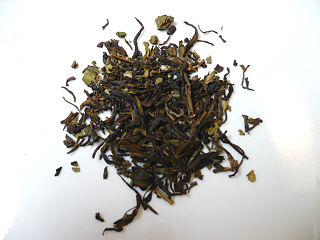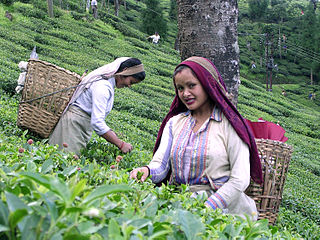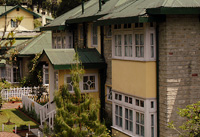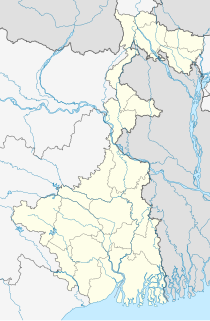
Darjeeling is a city and a municipality in the Indian state of West Bengal. It is located in the Lesser Himalayas at an elevation of 2,000 metres (6,700 ft). It is noted for its tea industry, its views of the world's third-highest mountain Kangchenjunga, and the Darjeeling Himalayan Railway, a UNESCO World Heritage Site. Darjeeling is the headquarters of the Darjeeling district which has a partially autonomous status called Gorkhaland Territorial Administration within the state of West Bengal. It is also a popular tourist destination in India.

Nilgiri tea is a drink made by infusing leaves of Camellia sinensis that is grown and processed in the Nilgiris district in Tamil Nadu, India. The leaves are processed as black tea, though some estates have expanded their product offerings to include leaves suitable for making green, white and oolong teas. It is generally described as being a brisk, fragrant and full-bodied tea. The region produces both rolled and crush, tear, curl tea and it is predominately used for blending. Nilgiri tea is also used for making iced tea and instant tea.

Darjeeling tea is a tea made from Camellia sinensis var. sinensis that is grown and processed in the Darjeeling or Kalimpong Districts in West Bengal, India. Since 2004, the term Darjeeling tea has been a registered geographical indication referring to products produced on certain estates within Darjeeling and Kalimpong. The tea leaves are processed as black tea, though some estates have expanded their product offerings to include leaves suitable for making green, white and oolong teas.

The culture of Darjeeling, India, is quite diverse and unique. The two predominant religions are Hinduism and Vajrayana Buddhism. Dashain, Tihar, Buddha Jayanti, Christmas, Holi, Ram Navami, etc. are the main festivals. Besides, the diverse ethnic populace of the town also celebrates several local festivals. Buddhist ethnic groups such as the Lepchas, Bhutias, Sherpas, Yolmos, Gurungs, and Tamangs celebrate new year called Losar in January/February, Maghe Sankranti, Chotrul Duchen, and Tendong Lho Rumfaat. The Kiranti Rai people (Khambus) celebrate their annual Sakela festivals of Ubhauli and Udhauli. Deusi and Bhaileni are songs performed by men and women, respectively, during the festival of Tihar. All these provide a "regional distinctness" of Darjeeling's local culture from the rest of India. Darjeeling Carnival, initiated by a civil society movement known as The Darjeeling Initiative, was a ten-day carnival held yearly during winter that portrayed the rich musical and cultural heritage of Darjeeling Hills as its central theme. Every year, cultural festivals are held in the town of Darjeeling and its surrounding areas.

India is one of the largest tea producers in the world, although over 70 percent of its tea is consumed within India itself. A number of renowned teas, such as Assam and Darjeeling, also grow exclusively in India. The Indian tea industry has grown to own many global tea brands and has evolved into one of the most technologically equipped tea industries in the world. Tea production, certification, exportation, and all other facets of the tea trade in India are controlled by the Tea Board of India.

Windamere Hotel, built as 'Ada Villa' in 1841 and then turned into a boarding house for tea planters and other Raj types, on contract, in the late 1880s. In 1939, it became 'Windamere Hotel', a colonial hotel situated on Observatory Hill, in Darjeeling, India.
Pussimbing is a tea estate in West Bengal, India.
The North Bengal Tea Industry production areas are in the North Bengal region of West Bengal state, in Eastern India. It includes tea estates and facilities in the districts of Darjeeling, Jalpaiguri, Cooch Behar, Kishanganj and North Dinajpur in West Bengal.
Louis Mandelli (1833–1880) was an Italian settler in India, a tea planter and amateur zoologist and ornithologist. Living in Darjeeling and collecting specimens of birds and animals around Sikkim, he discovered many species from the region and several were named after him. He is honoured in the names Locustella mandelli, Mandelli's Snowfinch and Mandelli's mouse-eared bat.

The Indian Tea Association is a trade association of Indian tea producers. The head office is in Kolkata (Calcutta).

Ambootia or Ambootay is a tea estate village in the Kurseong CD block in the Kurseong subdivision of the Darjeeling district in the state of West Bengal in India.
Makaibari Tea Estate is a tea garden in the Kurseong CD block in the Kurseong subdivision of the Darjeeling district in the Indian state of West Bengal.
Glenburn Tea Estate is a tea garden in the Rangli Rangliot CD block in the Darjeeling Sadar subdivision of the Darjeeling district in the Indian state of West Bengal.
Puttabong Tea Estate is a tea garden in the Darjeeling Pulbazar CD block in the Darjeeling Sadar subdivision of the Darjeeling district in the Indian state of West Bengal.
Lopchu Tea Estate is a tea garden in the Rangli Rangliot CD block in the Darjeeling Sadar subdivision of the Darjeeling district in the Indian state of West Bengal.
Okayti Tea Estate is a tea garden in the Mirik CD block in the Mirik subdivision of the Darjeeling district in the Indian state of West Bengal.

Rishihat Tea Garden is a village in the Darjeeling Pulbazar CD block in the Darjeeling Sadar subdivision of the Darjeeling district in the state of West Bengal, India.

Singbulli Tea Garden is a village in the Mirik CD block in the Mirik subdivision of the Darjeeling district in the state of West Bengal, India.
Goomtee Tea Estate is a tea garden in the Kurseong CD block in the Kurseong subdivision of the Darjeeling district in the Indian state of West Bengal.

Mohurgong & Gulma Tea Estates is a tea garden in the Matigara CD block in the Siliguri subdivision of Darjeeling district in the state of West Bengal, India.








